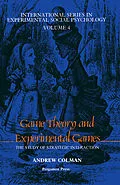Game Theory and Experimental Games: The Study of Strategic Interaction is a critical survey of the essential ideas of game theory and the findings of empirical research on strategic interaction. Some experiments using lifelike simulations of familiar kinds of strategic interactions are presented, and applications of game theory to the study of voting, the theory of evolution, and moral philosophy are discussed.
Comprised of 13 chapters, this volume begins with an informal definition of game theory and an outline of the types of social situations to which it applies. Games of skill, games of chance, and games of strategy are considered. Games of strategy are further subdivided into coordination, zero-sum, and mixed-motive varieties. Subsequent chapters deal with one-person games in which a solitary decision maker is pitted against Nature; the competitive nature of two-person, zero-sum games; the relationship between game theory and experimental games; and the mixed-motive character of variable-sum games that generate intrapersonal and interpersonal conflicts. Experiments with prisoner's dilemma as well as coalition, auction, and social dilemma games are also considered. Finally, some applications of game theory are described.
This book is designed for advanced undergraduates, graduate students, and relevant practitioners in social psychology, sociology, economics, and politics, and in some cases for a rather broader public.
Inhalt
Background
1 Introduction
1.1 Intuitive Background
1.2 Abstract Models: Basic Terminology
1.3 Skill, Chance, and Strategy
1.4 Historical Background
1.5 Summary
2 One-Person Games
2.1 Games Against Nature
2.2 Certainty
2.3 Risk
2.4 Utility Theory
2.5 Uncertainty
2.6 Summary
3 Pure Coordination Games and the Minimal Social Situation
3.1 Strategic Collaboration
3.2 Pure Coordination Games
3.3 The Minimal Social Situation
3.4 Summary
Theory and Empirical Evidence
4 Two-Person, Zero-Sum Games
4.1 Strictly Competitive Games
4.2 Extensive and Normal Forms
4.3 Games With Saddle-Points
4.4 Games Without Saddle-Points
4.5 Dominance and Admissibility
4.6 Methods for Finding Solutions
4.7 Ordinal Payoffs and Incomplete Information
4.8 Summary
5 Experiments With Strictly Competitive Games
5.1 Ideas Behind Experimental Games
5.2 Review of Research on Non-Saddle-Point Games
5.3 Review of Research on Saddle-Point Games
5.4 Critique of Experimental Gaming
5.5 Experiment I: Abstract and Lifelike Strictly Competitive Games
5.6 Summary
6 Two-Person, Mixed-Motive Games: Informal Game Theory
6.1 Mixed-Motive Games
6.2 Classification of 2 x 2 Mixed-Motive Games
6.3 Leader
6.4 Battle of the Sexes
6.5 Chicken
6.6 Prisoner's Dilemma
6.7 Comparison of the Archetypal 2 x 2 Games
6.8 Metagame Theory
6.9 Summary
7 Experiments With Prisoner's Dilemma and Related Games
7.1 The Experimental Gaming Literature
7.2 Strategic Structure
7.3 Payoffs and Incentives
7.4 Circumstances of Play
7.5 Responses to Programmed Strategies
7.6 Sex Differences
7.7 Attribution Effects
7.8 Investigations of Ecological Validity
7.9 Experiment II: Abstract and Lifelike Prisoner's Dilemma Games
7.10 Experiment III: Abstract and Lifelike Chicken Games
7.11 Summary
8 Multi-Person Games: Social Dilemmas
8.1 Multi-Person Game Theory
8.2 Non-Cooperative Games: Equilibrium Points
8.3 Cooperative Games: Characteristic Functions
8.4 Harold Pinter's "The Caretaker"
8.5 The Shapley Value
8.6 The Dollar Auction Game and the Concorde Fallacy
8.7 Multi-Person Prisoner's Dilemma
8.8 General Theory of Compound Games
8.9 Summary
9 Experiments with Coalition, Auction, & Social Dilemma Games
9.1 Multi-Person Experimental Games
9.2 Coalition Formation
9.3 Auction Games and Psychological Traps
9.4 N-Person Prisoner's Dilemma
9.5 Experiment IV: Abstract and Lifelike N-Person Prisoner's Dilemmas
9.6 Summary
Applications
10 Sincere Voting and Collective Choice Theory
10.1 Background
10.2 Alternatives, Voters, Preferences
10.3 Axioms Concerning Individual Preferences
10.4 Voting Procedures
10.5 Condorcet's Paradox
10.6 Probabilities of Cyclic Majorities
10.7 Arrow's Impossibility Theorem
10.8 The Borda Effect
10.9 Summary
11 Strategic Voting
11.1 Optimal Voting Strategies
11.2 Historical Background
11.3 Insincere Voting and Equilibrium Points
11.4 The Classical Solution: Dominance and Admissibility
11.5 Sophisticated Voting
11.6 Anticipated Decisions and Multistage Solutions
11.7 General Results on Strategic Voting
11.8 Is Strategic Voting Unfair?
11.9 Empirical Evidence
11.10 Summary
12 Theory of Evolution: Strategic Aspects
12.1 Historical Background
12.2 Strategic Evolution
12.3 Animal Conflicts and Evolutionarily Stable Strategies
12.4 An Improved Multi-Person Game Model
12.5 Empirical Evidence
12.6 Summary
13 Moral Philosophy and Practical Problems of Strategy
13.1 Game Theory and the Conduct of Life
13.2 Rationality and Self-Interest
13.3 Kant's Categorical Imperative
13.4 Rousseau's Social Contract
13.5 Evolution and Stability of Moral Principles
13.6 Summary
Appendix A: A Simple Proof of the Minimax Theorem
A.1 Introductory Remarks
A.2 Preliminary Formalization
A.3 The Minimax Theorem
A.4 Proof
References
Index
